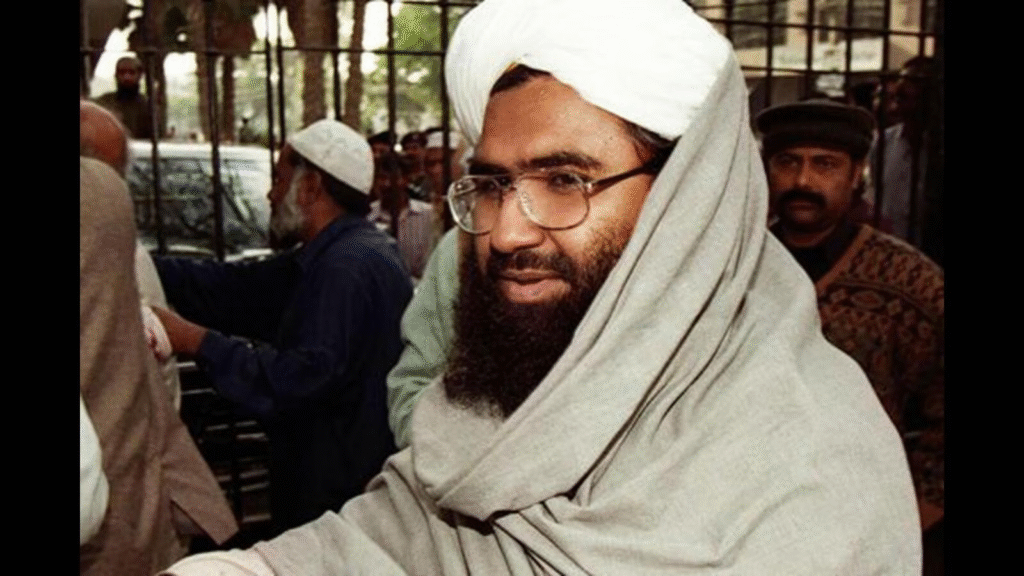
In a significant development in the fight against terrorism, Abdul Rauf Azhar, the notorious mastermind behind the infamous IC-814 hijacking, has reportedly been killed in Operation Sindoor. This operation, a coordinated effort between Indian intelligence and international allies, marks a critical milestone in dismantling terrorist networks operating against India. Abdul Rauf Azhar’s death not only delivers a symbolic victory but also sends a strong message about the relentless pursuit of justice for victims of terrorism.
The operation, which unfolded after months of meticulous planning, is a testament to the progress made in India’s counterterrorism efforts and its growing capacity to deal with high-value targets involved in acts of terror.
The IC-814 Hijacking: A Dark Chapter in Indian Aviation History
The name Abdul Rauf Azhar is synonymous with one of the most harrowing episodes in Indian aviation history. On December 24, 1999, Indian Airlines Flight IC-814 was hijacked by five armed terrorists while en route from Kathmandu to New Delhi. The hijackers diverted the plane to Kandahar, Afghanistan, which was then under Taliban control. The incident ended after seven days of intense negotiations, during which the Indian government agreed to release three terrorists in exchange for the hostages’ freedom.
Rauf Azhar, a key operative of the Pakistan-based terrorist organization Jaish-e-Mohammed (JeM), played a pivotal role in planning and executing the hijacking. His involvement underscored the deep-rooted nexus between state-sponsored terrorism and extremist groups operating in South Asia. The hijacking left an indelible scar on the national psyche and underscored vulnerabilities in India’s aviation security protocols at the time.
Rauf Azhar’s role in this operation showed the world the extent to which terrorists were willing to go to further their objectives. The hijacking not only endangered the lives of civilians but also highlighted the involvement of international terror networks in fueling the conflict between India and Pakistan.
The Human Cost of the Hijacking
The IC-814 hijacking was not merely a political and security crisis; it was a deeply personal tragedy for the passengers and crew on board. The ordeal included constant threats of violence, psychological trauma, and one tragic loss of life—the murder of passenger Rupin Katyal. His death highlighted the ruthless nature of the hijackers and intensified the urgency of negotiations. Families of the hostages endured excruciating uncertainty as the world watched the crisis unfold.
The hijacking’s emotional and psychological toll on the hostages cannot be understated. The hostage situation stretched over seven days, with passengers and crew experiencing constant stress, fear, and uncertainty about whether they would survive. For many, this was a life-changing event that left them with lifelong scars, both physically and mentally.
The tragic death of Rupin Katyal was an event that marked the entire nation, as it displayed the sheer brutality of the hijackers. His loss represents the innocent lives lost due to acts of terrorism, a sobering reminder of the human cost of extremist violence.
Operation Sindoor: A Well-Orchestrated Strike
The success of Operation Sindoor stands as a testament to the meticulous planning and execution by Indian intelligence agencies. The operation targeted a high-value militant group sheltering Rauf Azhar, who had evaded justice for decades. This mission required unprecedented levels of coordination, precision, and international collaboration.
Planning and Execution
According to sources, the operation was months in the making. Indian intelligence agencies worked closely with international partners to track Rauf Azhar’s movements and identify his safe houses. The operation culminated in a precise and coordinated strike, eliminating Azhar and several of his associates without collateral damage. Advanced surveillance techniques, combined with actionable intelligence, ensured that the mission’s objectives were met.
The mission relied on the expertise of a dedicated team of operatives and analysts who studied every aspect of Azhar’s movements and network. Through extensive intelligence gathering, they were able to pinpoint his location, confirm his identity, and execute a high-stakes mission with incredible precision.
The success of Operation Sindoor also signals India’s increased capacity to carry out such complex operations. The operation demonstrated the country’s growing sophistication in counterterrorism strategies, and it reinforced the importance of proactive action in the face of imminent threats.
International Cooperation
Operation Sindoor’s success highlights the importance of global collaboration in combating terrorism. The involvement of multiple intelligence agencies ensured accurate targeting and minimized the risks associated with such high-stakes missions. The operation’s international dimension reflects a shared commitment to addressing terrorism as a global threat rather than a localized issue.
Through cooperation with allies across the world, Indian intelligence agencies were able to utilize intelligence networks and assets that had been cultivated over years of partnerships. This allowed for a well-coordinated, precision strike that eliminated one of the most wanted terrorists.
While India took the lead in the operation, it was the assistance of international partners that made the mission truly successful. The operation showed that the fight against terrorism is not one that can be tackled in isolation; it requires a global response and a shared resolve to combat extremism wherever it may take root.
Rauf Azhar’s Legacy of Terror

Rauf Azhar’s death brings an end to a career defined by violence and extremism. As one of the top leaders of Jaish-e-Mohammed, he was instrumental in orchestrating several high-profile attacks against India, including the Pathankot Air Base attack in 2016 and various attempts to infiltrate Indian borders.
Role in JeM’s Hierarchy
Rauf Azhar’s prominence within JeM was no coincidence. As the younger brother of JeM’s founder, Maulana Masood Azhar, he wielded considerable influence within the organization. His operational expertise and strategic planning capabilities made him a key asset for JeM, particularly in its campaigns against India. Under his leadership, JeM expanded its reach, operational sophistication, and ability to recruit new members.
His involvement in JeM’s leadership made him a central figure in its campaign against India. By strengthening the organization’s operational capabilities, Rauf Azhar ensured that JeM was able to carry out multiple attacks, some of which led to significant casualties and destruction.
Impact on Terrorism in South Asia
Azhar’s elimination is a significant blow to JeM and its network. It disrupts the group’s leadership structure and weakens its operational capabilities. However, experts caution that other members of JeM’s leadership may attempt to fill the vacuum, necessitating continued vigilance. The ripple effects of his death will likely influence other extremist groups in the region, forcing them to rethink their strategies and alliances.
Azhar’s absence leaves a gap in JeM’s operations, which may temporarily cripple the group. However, given the decentralized nature of many such extremist organizations, it is unlikely that this victory will end the conflict entirely. Continued monitoring and counterterrorism efforts are essential to ensure that other figures do not step in to fill the void.
The Broader Implications of Operation Sindoor
While the death of Abdul Rauf Azhar is a significant achievement, it also raises critical questions about the future of counterterrorism efforts in the region. The operation’s success highlights both opportunities and challenges in addressing the root causes of terrorism.
Strengthening Counterterrorism Frameworks
Operation Sindoor underscores the need for robust counterterrorism frameworks that can adapt to the evolving nature of threats. India’s ability to neutralize high-value targets like Rauf Azhar demonstrates its growing capabilities in intelligence and operational planning. Continued investment in technology, training, and international partnerships will be crucial in sustaining this momentum.
Pakistan’s Accountability
The operation also reignites debates about Pakistan’s role in harboring and supporting terrorist organizations. Despite repeated international condemnation, Pakistan’s alleged complicity in sheltering figures like Rauf Azhar remains a contentious issue. India’s diplomatic efforts must continue to pressure Islamabad to dismantle terrorist infrastructure within its borders. Additionally, international organizations and allies must hold Pakistan accountable for its actions and ensure compliance with counterterrorism norms.
The role of Pakistan in harboring terrorist organizations is well documented, and international pressure on the country is a key component of addressing the threat of extremism in South Asia. The death of Rauf Azhar presents an opportunity for renewed diplomatic efforts to urge Pakistan to take stronger action against groups like JeM.
Victims of IC-814: Justice Served After Two Decades
For the victims and families affected by the IC-814 hijacking, the death of Rauf Azhar represents a long-awaited step towards justice. The traumatic events of December 1999 left an indelible mark on India, highlighting the human cost of terrorism.
Remembering the Hostages
The ordeal of the IC-814 hostages serves as a grim reminder of the vulnerability of civilian lives in the face of extremist violence. Their courage and resilience during the week-long hijacking remain an enduring source of inspiration. The government’s efforts to negotiate their release, despite the challenging circumstances, showcased a commitment to preserving lives.
Closure for Families
Rauf Azhar’s death offers a sense of closure to the families of the victims. While it cannot undo the pain and loss they endured, it reinforces the message that justice, though delayed, will ultimately prevail. The incident’s resolution also strengthens India’s resolve to prevent such tragedies in the future.
The legacy of the IC-814 hijacking and its victims is a constant reminder of the work that remains to be done to combat terrorism. While the elimination of Rauf Azhar marks a major victory, it is important not to forget the human cost of such violence.
Global Reactions to Rauf Azhar’s Death
The international community has largely welcomed the success of Operation Sindoor, recognizing it as a crucial step in the fight against terrorism.
United States and Allies
Countries like the United States, which have been vocal about combating global terrorism, have lauded India’s efforts. The operation aligns with broader international objectives of dismantling extremist networks and ensuring regional stability. Statements from allied nations highlight the importance of collective action in addressing security threats.
Pakistan’s Response
Unsurprisingly, Pakistan has downplayed the significance of Rauf Azhar’s death. Official statements have either denied his presence within Pakistani borders or dismissed the operation as propaganda. Such responses are consistent with Pakistan’s historical reluctance to acknowledge its role in harboring terrorists. This denial further complicates efforts to foster regional peace and security.

